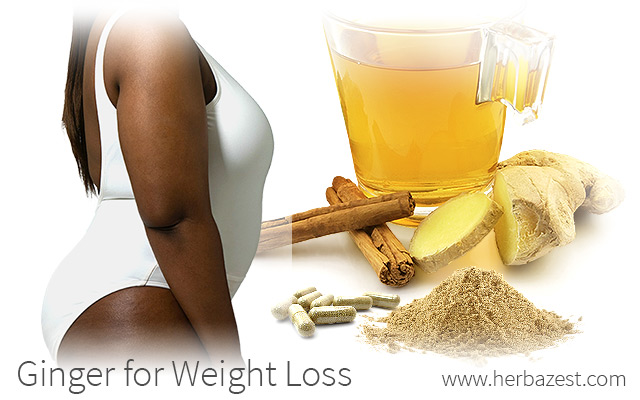If you're looking to get rid of those extra pounds, there are many herbs or herbal combinations you may find helpful. While herbs will not work magically, they can be used to complement exercise and diet in order to help maintain or meet your ideal weight. While the gingerol in ginger has been shown to aid in weight loss, this root may be more effective in combination with other herbs and as a part of a healthy meal plan.
Weight Gain: Causes and Triggers
Weight gain can occur for a number of reasons. For one, as you age, your metabolism slows down. This can have a negative impact on your weight if you eat too much, consume an unbalanced diet, or don't get enough exercise. Weight gain can also result from medications, hormonal changes, or medical problems.
Why Is Ginger Beneficial for Weight Loss?
Ginger's health benefits for weight loss may be found in its anti-inflammatory and antioxidant effects. For instance, it is known that oxidative stress can contribute to obesity, and the medicinal ginger properties have been found to combat inflammation caused by oxidative stress.
Furthermore, scientific findings suggest that ginger supplements may help you lose those extra pounds caused by a fatty diet. This is mostly due to the high levels of gingerol found in ginger, which have a carminative action that, in preliminary studies, has been shown to increase the metabolic rate and the expend of energy from fat stored in the body.
Taking Ginger for Weight Loss
Depending on the way in which ginger is prepared, it will have greater levels of shagaol or zingerone. When it is dried, the gingerols become shogaols, while zingerones are higher in cooked ginger. Shogaols have slightly more potent anti-inflammatory effects than zingerones; however, eating fresh, raw ginger is considered as effective as taking dried ginger for weight loss purposes.
In addition, ginger vitamins have antioxidative effects, particularly vitamin C (ascorbic acid). However, it should be noted that vitamin C breaks down when heated or during prolonged storage or exposure to light. For that reason, in order to reap both the anti-inflammatory and antioxidant benefits of ginger, it is best to consume this herb in its raw form.
When supplementing your diet with ginger, it is important to know the correct dosage. It is not recommended to take more than four grams of ginger daily in any form. However, you should consult with your doctor to find what dosage would be best for you.
Ginger's Weight Loss Benefits vs. Other Herbs
Ginger's weight loss benefits are a result of its anti-inflammatory and antioxidant abilities. However, there are a number of other herbs that are more directly linked to weight loss, such as chamomile, gentian, and dandelion. These herbs are best taken in infusions prior to eating, as they aid in the breakdown of fat and cholesterol.
Extensive ginger research and studies provide some insight on the benefits of this root for weight loss, mainly as a result of its anti-inflammatory and antioxidant effects. However, other readily available herbs are likely more beneficial than ginger in helping you lose weight and can be used in combination with it.
Sources
- Cleveland Clinic, Over-the-Counter & Herbal Remedies for Weight Loss
- Cornell University, Pretty in Pink: Grow Edible Ginger!
- Herbal Medicine: Biomolecular and Clinical Aspects, Chapter 7, The Amazing and Mighty Ginger
- International Journal of Molecular Sciences, Inflammation, Oxidative Stress, and Obesity, 2011
- Journal of the Science of Food and Agriculture, Anti-obesity action of gingerol: effect on lipid profile, insulin, leptin, amylase and lipase in male obese rats induced by a high-fat diet, 2014
- National Library of Medicine, Weight gain – unintentional
- The Journal for Nurse Practitioners, Using Herbal Remedies to Maintain Optimal Weight, 2010
- The Journal of Pharmacy and Pharmacology, Immunomodulatory activity of Zingiber officinale, Salvia officinalis L. and Syzygium aromaticum L. essential oils: evidence for humor- and cell-mediated responses, 2009
- United States Patent and Trademark Office, US Patent 7329419 B2, Herbal supplement to support weight loss
- Encyclopedia of Herbal Medicine, p. 155
- FAOSTAT, Statistics for Ginger Production
- USDA Nutrient Database, Basic Report: 11216, Ginger root, raw
- Journal of Medicinal Food, Anti-inflammatory properties of red ginger (Zingiber officinale var. Rubra) extract and suppression of nitric oxide production by its constituent, 2010
- Medicinal Plants of the World, p. 349
- International Journal of Preventive Medicine, Anti-Oxidative and Anti-Inflammatory Effects of Ginger in Health and Physical Activity, 2013
- Kew Royal Botanic Gardens, Zingiber officinale (ginger)
- University of Maryland Medical Center, Vitamin C (Ascorbic acid)




